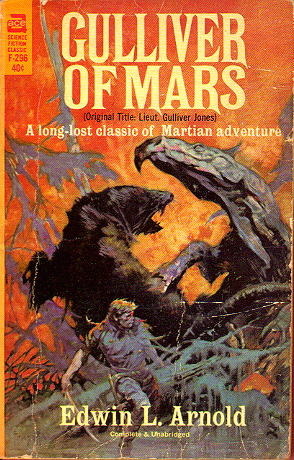Chapter VIII — Gulliver of Mars
byChapter VIII begins with the protagonist stirring from uneasy sleep, his head clouded by the wine and memories of a bizarre feast filled with unsettling visions. The lingering aroma of fruit and the ache of bruises confirm that the revelry was no mere dream. Heru’s face, once seen among candlelit laughter, now haunts his thoughts as he pieces together the truth. The remnants of joy have turned to dread as he realizes she may be in danger. The mood shifts quickly from hazy nostalgia to urgent concern. Driven by instinct and a growing sense of guilt, he hurries out to find her.
Outside, he meets Martians with vague answers and indifferent faces, telling him Heru was taken at daybreak. Anger bubbles inside him as he processes their apathy, unable to accept that no one had tried to stop it. He dresses swiftly, driven not just by duty but by something more primal—an unwillingness to let her slip away without a fight. When his call for help is met with silence, he heads for the harbor alone, unarmed but not unshaken. There’s no plan, only motion. His stride is fueled by desperation and the fading hope that she has not yet left.
The harbor teems with activity, but he finds her boat already leaving the shore, carried swiftly by the tide. Without hesitation, he leaps aboard, sword flashing as he confronts the abductors. His bravery is admirable, but the numbers are against him. Blades clang, voices rise, and chaos unfolds. In a moment of clarity, he spots Heru, her expression distant and fearful, before everything fades into blackness with the force of a club to his head. His strength may have failed him, but the resolve lingers even as consciousness slips away.
Waking on the open sea, he finds himself adrift on a floating heap of silk, the sun overhead and land distant on both sides. Pain throbs through his limbs, but he clings to awareness. The current is strong, dragging him to lands he does not know. With no oars, no guidance, only the mercy of water and wind, he watches unfamiliar shores pass in silence. Nightfall nears, bringing with it a deeper chill—one born of fear, not weather. Just as hopelessness creeps in, something breaks the horizon.
A shape cuts across the water—graceful, strong, alive. A stag, foreign yet somehow majestic, swims in steady strokes toward the distant land. A spark ignites within him. Clutching strands of silk, he throws them toward the beast, hoping for connection rather than conquest. Miraculously, the fabric entangles in the creature’s limbs, linking their fates. The stag, alarmed but not aggressive, begins towing him, unaware of the burden it carries.
Dragged slowly to the shore, he feels the hard pulse of survival return. The creature does not falter, and the tide, for once, seems to help. The land becomes clearer, sharper in its form, promising either refuge or another trial. But this time, he does not approach it empty-handed—he carries hope born from chance and courage. The Martian world, strange and often cruel, has shown him that willpower matters more than weapons. Whether this shore brings danger or salvation is irrelevant. What matters is that he reaches it.
In this chapter, the narrative deepens its emotional scope by blending physical peril with internal reflection. Each scene reveals not just the alien beauty of Mars, but the very human qualities of fear, determination, and love. Though the path forward is uncertain, the protagonist’s ability to adapt—even in weakness—cements him as more than just a visitor. He has become a force within this world, not because of strength, but because he refuses to surrender. And in the unpredictable current of Martian fate, even a stag can be a lifeline.

